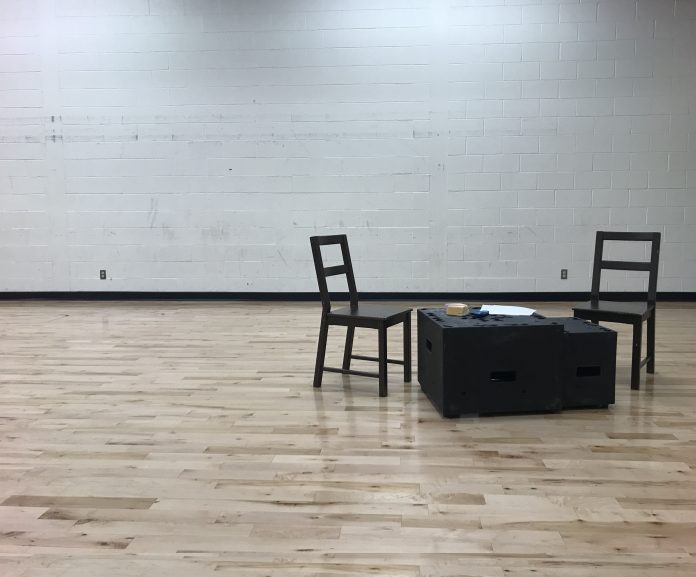The rehearsal studio. An actor’s playground. A collaborative cacophony of creative ideas. An escape into a world of make-believe.
This empty, windowless room with scuffed white walls and slick hardwood floors, has the ability to transform into a new world much like the actors transforming into their characters. The tape lines on the floor suggest where the dilapidated set pieces will go, which are taken from the overflowing garage of miscellaneous props and set pieces.
Upon arriving, none of the actors are there quite yet. Brett Mathews ‘19, the stage manager, is sweeping the floor with a dust mop so that the actors do not slip. All of the dust bunnies that have accumulated from previous rehearsals are pushed off to the side of the room.
Mathews then begins to put the creaky furniture into their respective spots in the space. Now the room has transformed, complete with a table and four chairs for the principal’s office on stage right and a couple of large black boxes for the kitchen area on stage left.
“My favorite prop is the sandwich that looks like moldy cheese,” said Irene Martinko ‘18, director of Conform, as Mathews throws a plastic yellow sandwich onto one of the boxes in the imaginary kitchen area.
Martinko is currently a senior at Muhlenberg where she is a theatre major with a concentration in directing and a double minor in music, and women’s and gender studies. She came to Muhlenberg thinking that she would want to concentrate in acting, but quickly realized during her Acting I class that it was not for her.
“We had done a few weeks of bonding exercises in Larry Singer’s class, and he said, ‘I know that you are all anxiously awaiting for me to assign you scenes so that you can get on your feet and start acting,’” said Martinko. “And everyone said, ‘yeah,’ and I thought ‘oh I’m dreading that.’”
However, she found her stride in the theatre department through directing.
“I realized that when I was an actor in rehearsal, I found myself wanting to make changes in the show that I wasn’t allowed to make,” said Martinko. “So, I wanted to be in those conversations of how a piece functions as a whole and not just what my character is supposed to do at what time.”
As Martinko works with Mathews to figure out lighting and sound cues, one-by-one the actors gradually enter the room ready to work. They energetically and enthusiastically engage with one another as if it is the first day of school after a long summer vacation.
Once all of the students have arrived, they begin their group warm-up. With the ‘NSYNC version of “Trashin’ the Camp” playing the background, the actors gather in a large circle and begin to copy one another’s equally goofy movements. Martinko does the sprinkler and her cast copies her through seemingly endless bouts of laughter. Laughing and dancing their way out of the circle, the actors grab their scripts to officially begin rehearsal. Without offering much direction, Martinko has her cast start from the top of the play.
As Eric Rosenblatt, ‘18 enters stage right along with Bobby Ottaviano, ‘18 and Sean Cheney, ‘20 Martinko watches them with the joy of an avid theatergoer and the astuteness of a strong director.
“Boy oh boy,” Rosenblatt says very casually, “I sure am excited to learn about the topics we are being taught by teachers.”
Their lines bounce off of one another like ping-pong balls. Each actor feeds off of each other’s energy and wit, making each run-through of each scene that much more exciting and invigorating. The passion in the actors’ eyes lights up the otherwise sparse room.
“You have to feel passionate about theatre or you can’t sustain it,” said Martinko. “Theatre is really difficult and takes a lot out of you.”
The collaborative and artistic atmosphere is at the core of the rehearsal space. Martinko allows her actors to write and rewrite, and live and breathe their character’s story throughout rehearsal. After the completion of each scene, she asks the actors “How did that feel?”
“Directing doesn’t need to be a hierarchy,” said Martinko. She does not place her actors like chess pieces on a board. She instead lets them glide through the space and cut their own path as they go through each individual scene.
“Try doing the scene without any awareness of space and the audience. See what happens,” said Martinko. Understanding her direction, the actors begin to play with the scene as Martinko sits back and lets her actors experiment. When the scene is finished, she asks her usual question, “How did that feel?”
The actors then smile and nod in approval. They offer their own feedback and create a dialogue with Martinko to figure out which direction they want to take the scene during the next run through.
“I think it’s very cool to tell a story in this way and to be a part of something so collaborative,” said Martinko. “I love that it’s such a welcoming environment.”
After two hours of rehearsal, Martinko closes with the same vibrant energy from the start of the rehearsal. The actors are still laughing and smiling, but they now must part ways. The set pieces are put back in the overly stuffed garage and scripts are placed into the actors backpacks.
The studio is back to being an empty, windowless room with scuffed white walls and slick hardwood floors. The actors are no longer playing a character in a play. Gradually, they leave as if recess is over and it is time to go back to class. The tightly knit group makes their exit from a world of make believe and storytelling to head back to reality, until the next rehearsal.





















